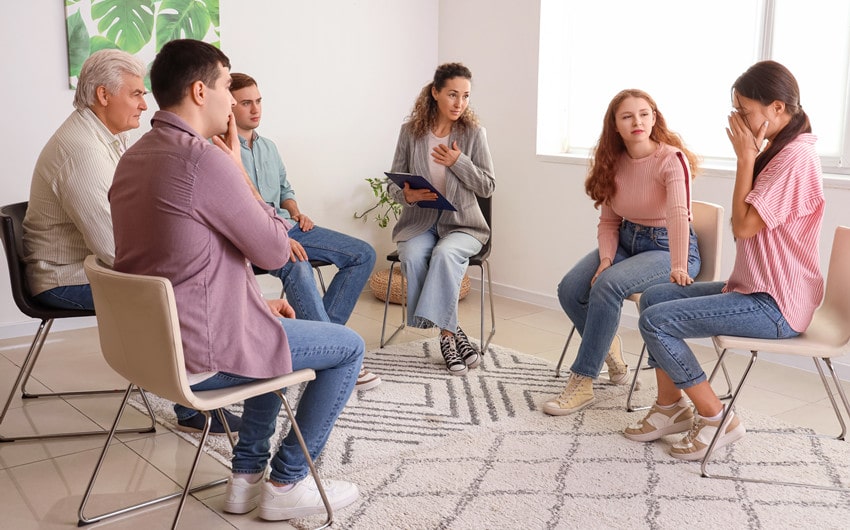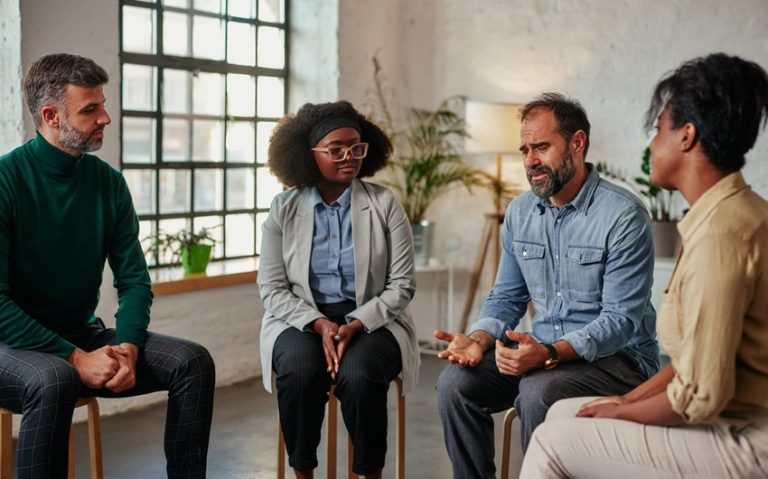The mental health industry is made up of many therapy options catering to a wide range of mental health disorders, as well as just support for those experiencing stress, sadness, or similar, without a formal diagnosis. There’s cognitive behavioral therapy, art therapy, talk therapy—the list goes on.
The one thing most forms of therapy have in common is that they are very individual. They are tailored specifically to the person undertaking them and they revolve entirely around their needs. One form of therapy with a point of difference when it comes to this is group therapy.
Group therapy treats multiple patients at once, and can be run by one or more healthcare professionals. It typically involves one or two hour meetings at regular intervals (often weekly), and meeting sizes can range from roughly five to fifteen people. Group therapy can be an effective treatment for trauma, anxiety, grief, substance abuse, and many other conditions and circumstances.
For those qualified through a Masters in Social Work online, group therapy might be a familiar concept, as they recommend it for those facing hardship, although for others it might feel intimidating—being vulnerable in front of strangers can be nerve wracking. But there are many benefits to group therapy.
Enhance social skills
By communicating with others in group therapy, patients can develop their social skills. This type of therapy requires storytelling, listening, recognizing social queues and body language, and supporting others. Each of these present their own valuable benefits to the people undertaking them.
Patients must practice their communication skills in a way that helps to develop their own ability to show empathy and compassion, manage frustration, and recognize how others are feeling. It also provides an opportunity to face difficult, and potentially even triggering topics, head on—providing the skills to not only handle delicate topics lightly, but also improve their own coping mechanisms.
Relate to others’ experiences
Being able to hear other people’s stories allows for participants to relate to each other on their unique experiences–oftentimes experiences that they can’t relate to many others on. For example, in a group therapy meeting for those facing substance abuse, listening to each others’ stories shows participants that they aren’t alone, and might help them better understand their own journey, or even feel better, or less insecure, about their stories.
Get different perspectives
Getting different perspectives in group therapy is beneficial in many ways. With a variety of people comes different experiences, stories, voices, and opinions—and these can all be valuable to each participant’s own personal journey. We all have something to learn from the people around us, and this is especially true in environments like group therapy where the focus is sharing.
Sharing experiences might even help participants find new ways of coping with, treating, or simply facing their struggles, as they get to hear what is effective for others. Finding effective new strategies might make a significant difference in a person’s recovery or treatment.
Typically members of a group will also be at different stages in their treatment, so this means that those who are further into it can impart their knowledge on those just starting out—giving them advice and hope for their futures.
Opportunities to provide support
Inherent in group therapy is a unique sense of camaraderie. As discussed already, there are many opportunities and benefits for participants to provide each other with support in different ways, whether that be through specific advice or by simply providing an open mind and listening.
In addition to the benefits to a person’s treatment or recovery, being there to provide others with support provides a unique opportunity to develop one’s personal skills and enhance their general life satisfaction. Learning to support others in effective, compassionate ways develops a person’s skills in communication, empathy, and listening. Many people also find great satisfaction in supporting and helping others, particularly through difficult circumstances where they can make a genuine difference in someone’s life.
Group therapy is just one option when it comes to mental health treatment. For many, it’s an effective form of therapy that offers unique benefits to those who undertake it. If you think group therapy might be right for you, consider talking to a doctor or mental health professional who will be able to assess its suitability and point you in the right direction.







